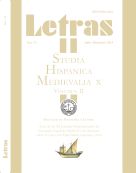The Names of the Law. Identity and Authority in the Castilian Fazaña
Keywords:
Castilian Manorial Law, Discourse Analysis, Castilian Nobility, Castilian FazañaAbstract
One of the most salient features of territorial law preserved in the manuscript 431 of the National Library of Spain is the record of men of flesh and blood who starred in the fueros and fazañas collected in the codex. If in the first instance proper names can be regarded as being intended to designate a single referent and call the whole essence held in the name, the set of names spread out along the codex has other consequences: the onomastic system rubricates the statute no longer referring to the individual but, on another level of meaning, metaphorically, to the class, the noble estate. The proper name, then, subordinates denotation to connotation, the substantivity of an object to a generality and a worldview. It is this worldview what will be highlighted in this paper. We ultimately seek to analyze the syntactic uses which organize events as intrigue in some fazañas, ie how the subjects, predicatives complements are arranged. The study of some singular plots in the Fazaña included in Ms. 431 will focus on establishing the logic according to which proper names are articulated in the manuscript , that is, the signature of the text, not as a personalized speech appendix (which, of course, the codex in question lacks) but as a brand or proof of identity.Downloads
Download data is not yet available.
Downloads
Published
2019-04-23
How to Cite
Soler Bistué, M. A. (2019). The Names of the Law. Identity and Authority in the Castilian Fazaña. Letras, 2(72), 155–166. Retrieved from https://e-revistas.uca.edu.ar/index.php/LET/article/view/1781
Issue
Section
Ponencias. Estudios de literatura española medieval
License












